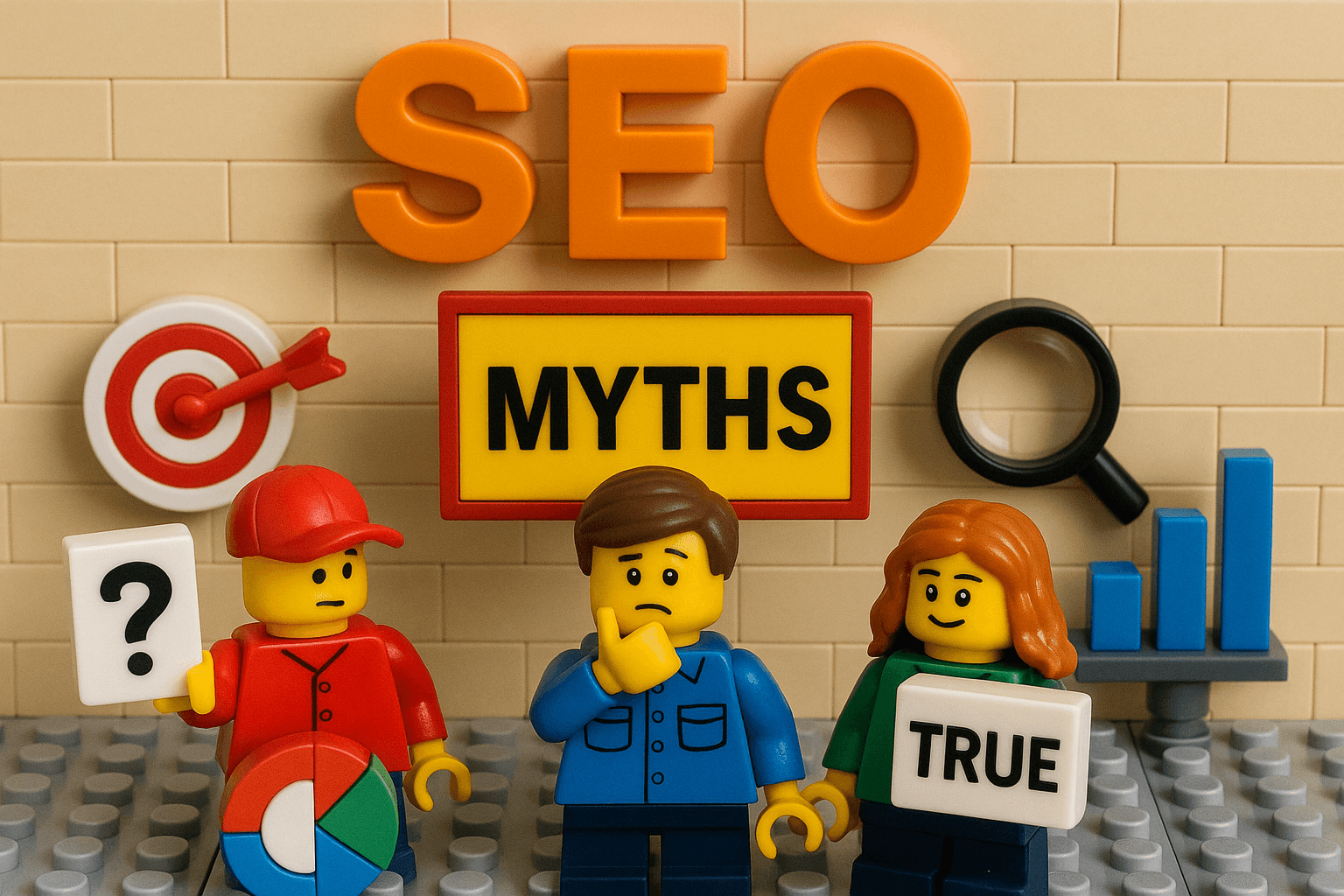Trying to run a business today will present even the most luck prone individual with a raft of challenges. Beyond the age-old, offline, issues such as staffing and payroll, you now have the whole world of potential competition via the internet. Most brands or businesses can benefit from effective digital marketing, but many whose survival relies upon it.
One channel that more experienced business owners are now only too familiar with (although may still struggle to explain) is SEO. Advice can sometimes feel more like folklore than clear and actionable guidance; and for every recommendation for a particular approach or tactic there will be another voice that contradicts it.
As an SEO agency in the Midlands, it’s a little easier to keep our ear to the ground and stay up to date with the rapidly changing world of search, which isn’t hyperbole by the way, the advent of AI overviews and more recently AI mode from Google, which has upset the apple cart for many in the world of search marketing.
With constant algorithm tweaks and evolving user habits, it’s easy for myths to take hold. Here are 15 of the most recent—and surprising—SEO misconceptions, re-ordered to challenge your assumptions and help you focus on what really matters.
1. There’s a One-Size-Fits-All Approach to SEO
Many marketers believe that a single SEO strategy can work wonders for every business, but nothing could be further from the truth. What works for a local Manchester consultancy won’t necessarily suit a multinational firm based in London. Successful SEO is inherently contextual, requiring bespoke approaches that reflect your industry, target audience, and competitive landscape.
2. Once Your Copy Is Optimised, You’re Done
It’s a common misconception that optimising your website copy is a one-and-done task. In reality, the digital landscape is dynamic. As market trends shift and user behaviour evolves, revisiting and refreshing your content is essential. Regular updates ensure that your message remains relevant and that you continue to meet your audience’s needs.
3. You Must Blog Every Day
The pressure to produce daily blog posts is widespread, yet quality should always triumph over quantity. For many UK B2B businesses, it’s far more effective to publish well-researched, authoritative content on a measured schedule than to overwhelm your audience with constant updates. Consistency and substance win out over a frantic publishing calendar.
4. Big Brands Always Outrank Small Competitors
It’s easy to assume that established names automatically dominate the search results, but smaller businesses have plenty of room to shine. By focusing on niche markets and localised content, many smaller UK companies have successfully challenged larger competitors. Brand recognition is important, but strategic, targeted SEO can level the playing field.
5. Domain Age Is a Major Ranking Factor
There’s a persistent belief that older websites inherently enjoy a ranking boost. However, it’s not the age of your domain that matters—it’s the authority you build over time through quality content, robust backlink profiles, and sustained user engagement. A fresh website that meets searcher intent can outpace an older one with outdated content.
6. Hidden or Tabbed Content Loses Value
Some marketers worry that placing content behind tabs or accordions will reduce its visibility to search engines. Modern crawlers are far smarter than this myth suggests. As long as the content is present in your HTML and accessible to search engines, it remains just as valuable—even if it’s not immediately visible on page load.
7. LSI Keywords Are a Magic Bullet
The idea that stuffing your copy with latent semantic indexing (LSI) keywords will magically boost your rankings is outdated. Today’s search engines understand context and natural language far better than they did a few years ago. Rather than forcing in related terms, focus on creating engaging, natural content that genuinely answers your audience’s questions.
8. Google Analytics Data Directly Affects Rankings
There’s often anxiety around metrics like bounce rate and time on page, with many assuming these figures directly influence your search rankings. In truth, while engagement metrics can signal quality issues to inform your optimisation efforts, the raw data from Google Analytics isn’t fed straight into ranking algorithms. Use your analytics as a guide, not a gospel truth.
9. The Canonical Tag Guarantees Top Rankings
Webmasters sometimes assume that setting a canonical tag ensures your preferred version of a page will be the one ranked. Although canonical tags help prevent duplicate content issues, they’re just one signal among many. If another version of the content boasts stronger backlinks or a better internal linking structure, it might still take precedence in the search results.
10. All High-Authority Backlinks Are Created Equal
It’s a widespread belief that any backlink from a high-authority site is inherently beneficial. In practice, not all backlinks carry the same weight. The context of the link, its placement, and its relevance to your niche can all affect its value. A contextual link from a respected UK industry blog may be far more valuable than a generic mention from a high-authority site outside your sector.
11. Website Migrations Are Just About Redirects
When moving to a new platform or redesigning your site, some think that setting up a few 301 redirects is all that’s needed. In reality, website migrations are complex endeavours. They require careful planning, testing, and ongoing monitoring to ensure that content, metadata, internal links, and user experience are preserved. Overlooking any of these elements can lead to significant drops in traffic and rankings.
12. You Need Lightning-Fast Page Speeds to Rank
While site speed is undoubtedly important for user experience and technical SEO, the myth that only ultra-fast pages can rank is an oversimplification. It’s more important to strike a balance: optimise your site for speed without sacrificing quality content or functionality. For most businesses, a reasonably fast site combined with a stellar user experience is plenty.
13. Crawl Budget Is a Major Issue for Every Website
The concept of crawl budget can sound intimidating, especially for smaller sites. However, this concern is largely overblown for most UK businesses. Crawl budget becomes critical only for very large or complex sites. For the majority of companies, ensuring your site is well-structured and updated regularly is sufficient to keep search engines happy.
14. SEO Always Takes Exactly Three Months to Show Results
The notion of a three-month magic formula is one of the most stubborn myths around. In reality, the time it takes to see measurable SEO improvements depends on your industry, competition, and current website health. Some changes may lead to quick wins, while more competitive sectors might require a sustained effort over a longer period. Patience and flexibility are key.
15. Better Content Automatically Means Better Rankings
It’s tempting to believe that simply creating superior content guarantees top rankings. However, while quality is critical, it isn’t the only factor at play. Even excellent content can struggle if it’s hampered by technical issues or overshadowed by stronger optimisation strategies elsewhere on your site. The secret is to integrate quality content into a comprehensive SEO strategy that addresses every facet of user experience.
Armed with these insights, you can sidestep common pitfalls and focus on strategies that truly drive results. But if you want some assistance in looking under the hood of your online properties then please request an SEO audit today. We can discuss the challenges you’re facing, or provide a quick audit FOC to see if we’re a good fit.






Leave a Reply